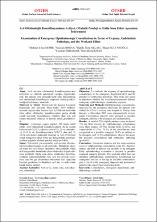Examination of Emergency Ophthalmologic Consultations in Terms of Urgency, Ophthalmic Pathology, and the Weekend Effect

View/
Access
info:eu-repo/semantics/openAccessDate
2021Author
Demir, Mehmet CihatBoğan, Mustafa
Akçam, Hanife Tuba
Sultanoğlu, Hasan
Özdamar, Yasemin
Ağaçkıran, İlter
Metadata
Show full item recordCitation
Demir, M. C., Boğan, M., Akçam, H. T., Sultanoğlu, H., Özdamar, Y., & AĞAÇKIRAN, İ. (2021). Examination of Emergency Ophthalmologic Consultations in Terms of Urgency, Ophthalmic Pathology, and the Weekend Effect. Online Türk Sağlık Bilimleri Dergisi, 6(3), 433-439.Abstract
Objective: To evaluate the urgency of ophthalmology consultations in the emergency department (ED) and the presence of ophthalmic pathology. This study also aimed to determine whether the weekend phenomenon affected emergency ophthalmologic consultation requests. Materials and Methods: Ophthalmology consultations requested by the emergency physician for patients who visited the ED of a tertiary care hospital in Turkey from January to December 2019 were retrospectively investigated. Consultation requests were grouped as possible emergent, unlikely to be emergent, and undetermined. Results: A total of 256 eligible patients were included. The top three reasons for ophthalmologic consultations were blunt trauma (29.7%), foreign body (24.2%), and conjunctivitis (13.3%). 70.3% of the consultations were categorized as a possible emergent, 18.4% as unlikely to be emergent, and 11.3% undetermined. Most of the possible emergent consultations had ophthalmic pathology (p=0.001). Conclusion: Traumatic injuries are the most common cause of ophthalmology consultation in the ED. Approximately one-fifth of patients are unlikely to be emergent. Early ophthalmology evaluation is required in possible emergent category patients. The weekend effect does not influence ophthalmology consultations. Establishing eye emergency services or having an available ophthalmologist is crucial in the emergency diagnosis and treatment of patients who require special practice skills. Amaç: Acil serviste oftalmoloji konsültasyonlarının aciliyetini ve oftalmik patolojinin varlığını değerlendirmek. Bu çalışma aynı zamanda hafta sonu fenomeninin, acil oftalmolojik konsültasyon taleplerini etkileyip etkilemediğini belirlemeyi amaçladı. Materyal ve Metot: Türkiye'de bir üçüncü basamak hastanenin acil servisini Ocak-Aralık 2019 tarihleri arasında ziyaret eden hastalar için acil hekimi tarafından talep edilen oftalmoloji konsültasyonları geriye dönük olarak incelendi. Konsültasyon talepleri olası acil, acil olması muhtemel olmayan ve belirsiz olarak gruplandırıldı. Bulgular: Çalışmaya uygun toplam 256 hasta dahil edildi. Acil oftalmolojik konsültasyonların ilk üç nedeni künt travma (%29,7), yabancı cisim (%24,2) ve konjonktivit (%13,3) idi. Konsültasyonların %70,3'ü olası acil, % 18,4'ü acil olması muhtemel olmayan ve %11,3'ü belirsiz olarak kategorize edildi. Olası acil kategorideki konsültasyonların çoğunda oftalmik patoloji vardı (p=0.001). Sonuç: Travmatik yaralanmalar acil serviste oftalmoloji konsültasyonunun en sık nedenidir. Hastaların yaklaşık beşte biri acil olması muhtemel olmayanlardır. Olası acil kategorideki hastalarda erken oftalmoloji değerlendirmesi gereklidir. Hafta sonu etkisi, oftalmoloji konsültasyonlarını etkilememektedir. Göz acil servislerinin kurulması veya bir göz doktorunun bulunması özel uygulama becerisi gerektiren bu hastaların acil tanı ve tedavisinde büyük öneme sahiptir
Volume
6Issue
3URI
https://doi.org10.26453/otjhs.939569https://app.trdizin.gov.tr/makale/TkRNNU16ZzBOQT09
https://hdl.handle.net/11491/8306
Collections
- Makale Koleksiyonu [517]
- TR-Dizin İndeksli Yayınlar Koleksiyonu [1602]

















